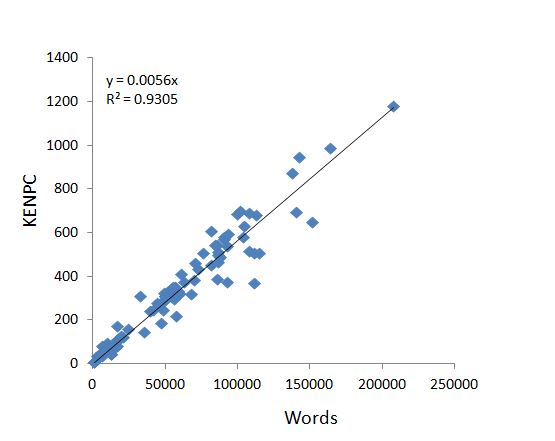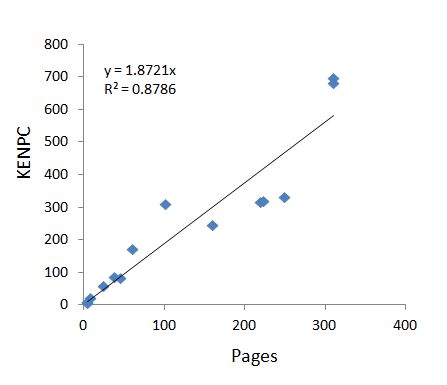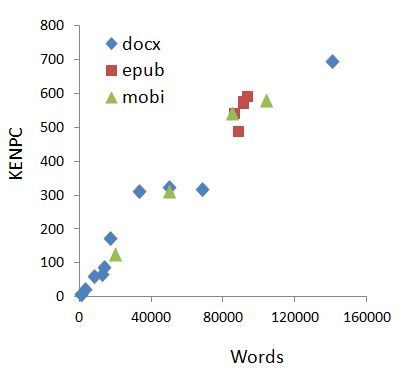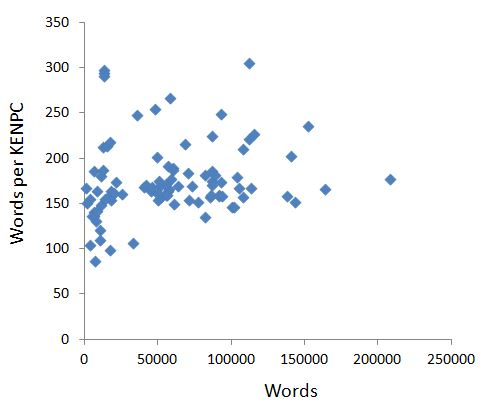For those of you who don’t know, ‘KENP’ stands for “Kindle Edition Normalized Pages”. It is now how Amazon standardizes book length in their Kindle Unlimited (KU) program, with authors receiving payment for ‘KENP read’. It is supposed to be a fair way to give authors in KU credit for how much of their work is read, and came about in-part because of the unfair advantage shorter works received in the earlier system (where all works received the same payment irrespective of length). Naturally, since it directly affects the pocketbooks of authors, there is quite a bit of consternation as to how exactly KENP is calculated, and how different approaches- formatting, images, front and back matter, file format, etc. affect these calculations. As usual, Amazon keeps their methods to themselves.
Anyway, I am a big fan of kboards, It is an amazing resource for writers. One of the more recent topics there was asking authors to detail their KENP count vs. word count in their works. Reading through all the responses in that topic, I thought it would be useful to take a higher-level look, and see what the data actually looked like all together. I posted something similar there as well, but here’s an overview of those data:
Mean Words per KENP: 173.4
Min Words per KENP: 86
Max Words per KENP: 305
Samples: 93
Here is a plot showing your reported total words and KENP counts (KENPC):
 You can see most authors are pretty strongly along the line, the regression equation tells us we get 0.0056 KENPC per word. That works out to a words per KENPC of 178.6, which is pretty close to the observed mean above. The R^2 value is pretty high too, 0.93, so words alone explain a lot of the variation in the number of KENPC you get. You can see though, there are notable outliers, especially below the line- these are writers who are especially unhappy. Some of these may have erroneously reported actual pages listed on their product page though, and not KENPC (I won’t go into this here, but I do over at kboards). Here is a plot showing reported Amazon pages and KENPC:
You can see most authors are pretty strongly along the line, the regression equation tells us we get 0.0056 KENPC per word. That works out to a words per KENPC of 178.6, which is pretty close to the observed mean above. The R^2 value is pretty high too, 0.93, so words alone explain a lot of the variation in the number of KENPC you get. You can see though, there are notable outliers, especially below the line- these are writers who are especially unhappy. Some of these may have erroneously reported actual pages listed on their product page though, and not KENPC (I won’t go into this here, but I do over at kboards). Here is a plot showing reported Amazon pages and KENPC:
 Fewer samples here, and not as strong as a regression, but for your viewing pleasure anyway. Here we get an estimate of 1.87 KENPC per ‘Zon page.’ Again this is not print pages (i.e.not from a print version) but the auto-generated value put on the public book page by Amazon.
Fewer samples here, and not as strong as a regression, but for your viewing pleasure anyway. Here we get an estimate of 1.87 KENPC per ‘Zon page.’ Again this is not print pages (i.e.not from a print version) but the auto-generated value put on the public book page by Amazon.
Here’s one that many author’s were concerned about- namely how the file-type uploaded might affect KENPC:
 For those data points where file-type info was provided, I broke down the chart to display words per KENPC for each type (doc/docx, mobi and epub). I didn’t do any statistical comparisons of the three types, but I think visually, it’s pretty clear that all three generally perform the same.
For those data points where file-type info was provided, I broke down the chart to display words per KENPC for each type (doc/docx, mobi and epub). I didn’t do any statistical comparisons of the three types, but I think visually, it’s pretty clear that all three generally perform the same.
Finally, just to test a hunch I had, here is words per KENPC versus total words. I wanted to see if there were any biases against shorter or longer works:
 It appears there are not. I don’t show the regression, but the R^2 was only 0.03 and the slope of the line was only slightly upward, so I think my hunch was wrong, and all lengths get treated generally the same.
It appears there are not. I don’t show the regression, but the R^2 was only 0.03 and the slope of the line was only slightly upward, so I think my hunch was wrong, and all lengths get treated generally the same.
So caveats- I could only present this based on what was reported, and obviously for some data types not many did (e.g. file type). Also, some reported heavy images, and fiction vs non-fiction, lots of dialogue vs lots of narration, etc.- I can’t really quantify those, and it may be where some of the variation is seen. The only curation I did was to remove the data for those I thought were accidentally reporting Amazon pages and not KENPC.
It’s up to you what these charts mean, and I hope they are interesting and useful. There were many anecdotal stories from the thread of formatting changes strongly affecting KENPC, so there may be more to it. But from what was reported, it looks like total words is a pretty darn good predictor for KENPC for most of us.

For the statistically-challenged, what are you saying? Is it not 1 KENP equals one normal page? If my book is 250 pages, will Amazon show 250 KENP, or something close to that? That’s my simple way of interpreting KENP.
Linda,
Based on the data reported at kboards, it was 1.87 KENP per page, so a 250 ‘page’ e-book should come in around 465-470 KENP, but it could be somewhat more or less. Total words will be more accurate, so take your total words and multiply by 0.0056 to get a good guess at KENP. Keep in mind again this is not real printed pages, but what Amazon guesses for an e-book.
I hope this helps!
Hllo! I simρly wsh tο gνe you a big thumb up f th great nfomaton you have got right hee on thi post. am coming back t our it for mο oon.
Good info (and presentation), Ian!
A related question: what is a decent formula to get from “word count” to ‘zon pages (not KENP but the ones they just call “print length” even though these are Kindle ebooks and are not printed). This is important to me in writing shorter works. Especially for Amazon’s “Short Reads” section where everything is based on “pages.” Does this formula make sense? …
[words x 0.0056] divided by 1.87 = ‘Zon pages’
Thanks!
P.S. I’m never coming to Portland. Ever. Don’t worry.
Harald,
Good question. I have to say I’ve never calculated that, and don’t have the data to give you an answer. In any case, Amazon changed the KENP calcs since I posted this, and they may have for normal pages as well. I do know that KENP are much more than ‘Zon pages’, as are print pages.
Thanks for stopping by and good luck in figuring this out!
This is all great stuff, but for those of us who don’t have a clue as to what you’re talking about, what is the bottom line? Is using Amazon profitable for writers and what are you paid per KENP. I have read all three episodes of Shattered Earth and have been searching for episodes 4&5, can’t find them?
Gary,
This post is actually pretty dated- Amazon changed their formulas, and so this information is not really accurate anymore, though still probably in the ballpark.
As for Shattered Earth- thank you so much for reading it! I haven’t abandoned the story, but got bogged down in real life and so the episodes are not finished. I will be back on the story though very soon. Please be patient! Again sorry…
-Ian